Employee onboarding is a critical phase in the employee lifecycle, setting the tone for the new hire’s journey within the organization. Traditional onboarding processes, especially for campus hires, often face numerous challenges that can lead to inefficiencies and dissatisfaction.
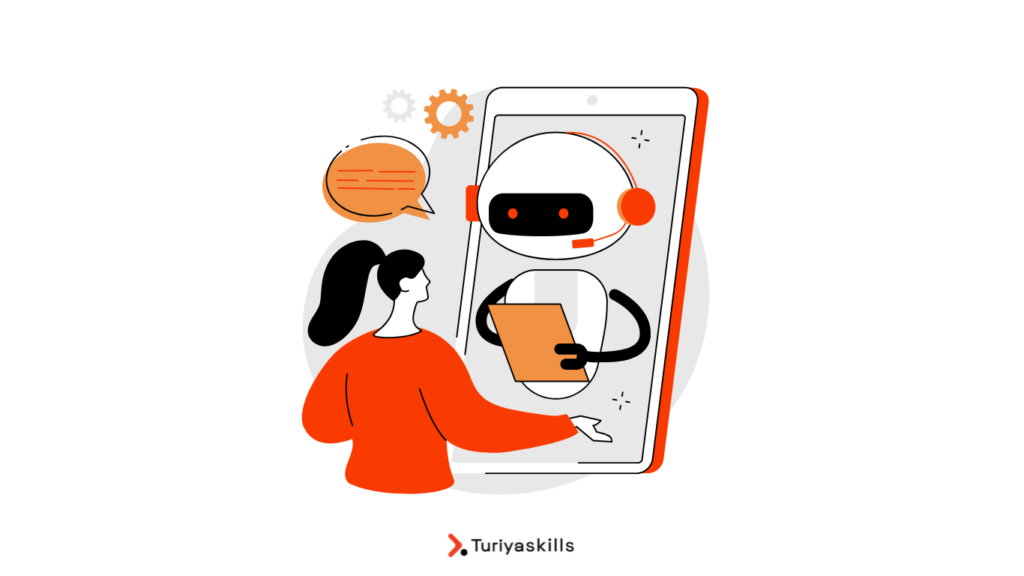
However, the advent of Artificial Intelligence (AI) is poised to revolutionize this space, offering solutions that streamline, personalize, and enhance the onboarding experience.
Challenges in Traditional Campus Hire Programs
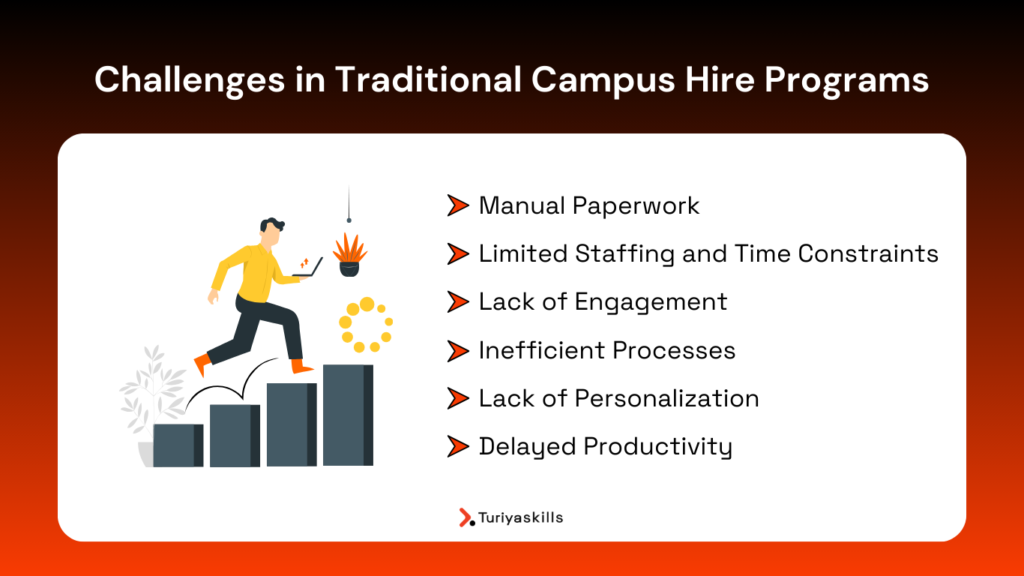
Traditional campus hire programs are fraught with several challenges:
Manual Paperwork
New hires often face an overwhelming amount of paperwork, which can be tedious and time-consuming for both the employee and the HR team. This manual process is prone to errors and inefficiencies, delaying the onboarding process and reducing productivity.
Limited Staffing and Time Constraints
The manual or “traditional” hiring process tends to be slow and complicated, often leading to missed opportunities. Recruitment teams focusing on academic institutions encounter time constraints when attempting to reach out and engage with a sufficient pool of candidates to fulfill their hiring objectives. The complexity and costs associated with recruiting at a distance often result in a reliance on core schools, ultimately missing out on qualified hiring opportunities.
Lack of Engagement
Traditional methods of onboarding can be repetitive, resulting in disengagement and a weaker bond with the organization. Outdated campus recruitment techniques don’t stand out in a market that is extremely crowded and competitive. Failing to provide a positive candidate experience can have a much bigger impact in the digital age, as students and candidates are quick to voice their opinions when their expectations aren’t met.
Inefficient Processes
Manual processes are prone to errors and inefficiencies, delaying the onboarding process and reducing productivity. Coordinating between departments and ensuring a consistent yet personalized experience can be challenging. This often results in a chaotic onboarding process that can be off-putting to new employees.
Lack of Personalization
One-size-fits-all onboarding programs fail to cater to the individual needs and learning styles of new hires. Traditional onboarding processes are solely designed from an organization’s standpoint, focusing on legal information, documents, and insurmountable paperwork, with little attention given to employee experience and expectations.
Delayed Productivity
Inefficient onboarding can delay the time it takes for new hires to become fully productive, impacting overall organizational performance. Without a structured onboarding process, new hires may feel overwhelmed and underqualified for the jobs they were hired to do, leading to high turnover rates.
How AI Transforms New Hire Onboarding
AI has the potential to address these challenges by transforming the onboarding process in several ways:
Automation of Routine Tasks
AI can automate repetitive tasks such as paperwork, scheduling, and compliance tracking, freeing up HR professionals to focus on more strategic activities. This reduces the administrative burden on HR teams and ensures that all necessary paperwork is completed accurately and on time.
Personalized Onboarding Experience
AI can tailor the onboarding process to individual needs, learning styles, and job roles, making the experience more engaging and effective. By analyzing the skills, preferences, and learning styles of new hires, AI can create customized training programs that ensure new employees receive the specific support they need to succeed in their roles.
24/7 Support
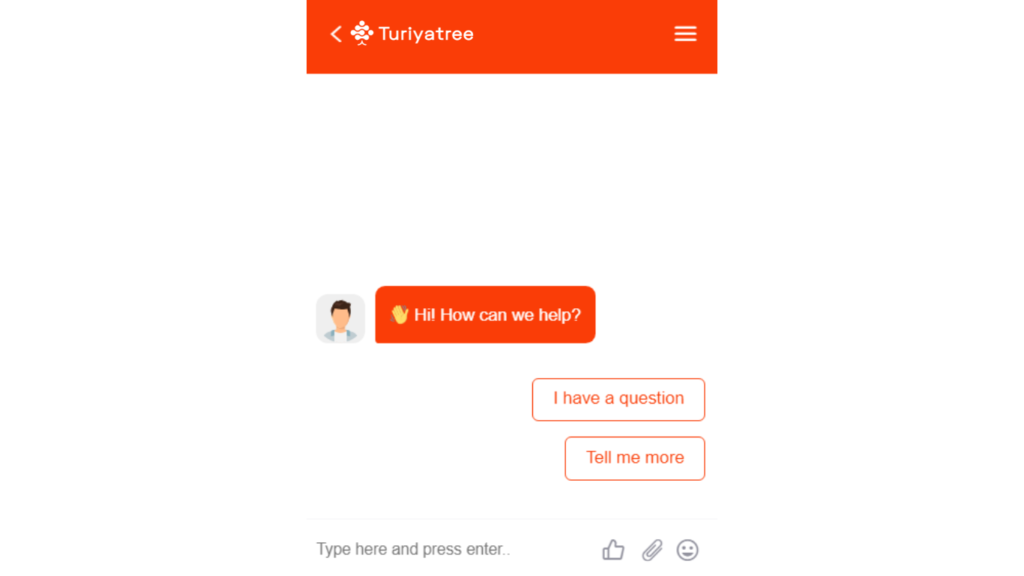
AI-powered chatbots can provide round-the-clock support to new hires, answering their questions and guiding them through the onboarding process. This feature enhances the onboarding experience by providing timely assistance and reducing the workload on HR staff.
Data-Driven Insights
AI collects and analyzes data to provide insights into the onboarding process, helping to continuously improve and customize the experience. Predictive analytics can analyze data from various sources to predict potential issues or areas of improvement in the onboarding process. This proactive approach helps in addressing concerns before they escalate, ensuring a smoother onboarding experience.
Enhanced Candidate Experience
AI can enhance the candidate experience by providing a seamless and engaging onboarding process. By automating tedious yet necessary tasks like interview scheduling and reference checks, AI frees up recruiters’ time to focus on making the first touch a positive one for students across the board.
Efficient Management of Large Recruitment Drive Volumes
AI can efficiently manage high volumes of candidates, making it ideal for large recruitment drives. AI tools can screen resumes, schedule interviews, and even conduct preliminary assessments, significantly reducing the time and effort required for high-volume hiring. This ensures that no candidate is overlooked and that the best talent is identified and hired quickly.
Benefits of AI in Campus Hire and Onboarding
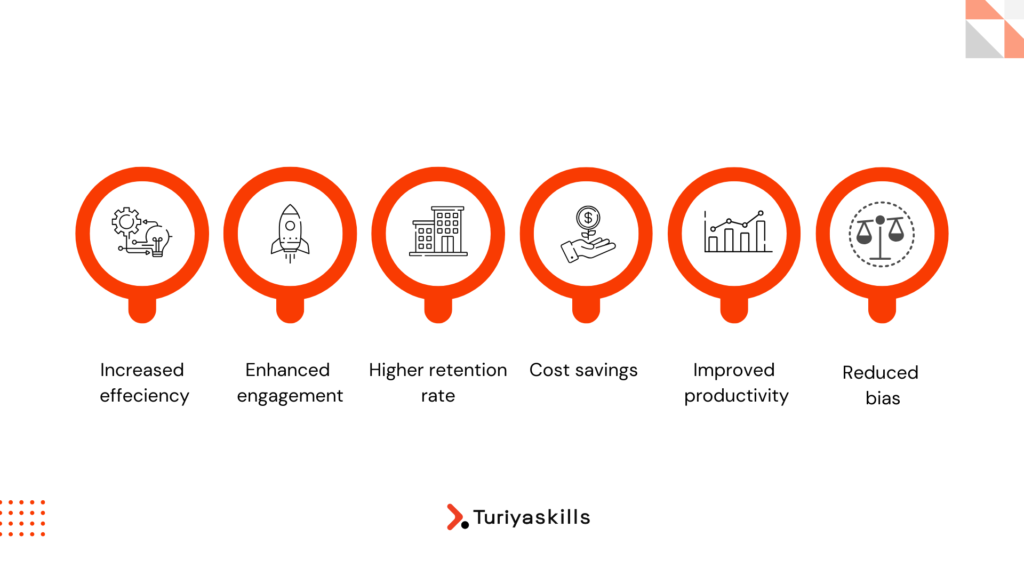
Implementing AI in campus hire and onboarding processes offers several benefits:
Increased Efficiency
Automation reduces the time and effort required for onboarding, speeding up the process. Through the automation of routine tasks, AI enables HR professionals to prioritize strategic activities, enhancing overall efficiency. For instance, AI can handle the generation, distribution, and tracking of onboarding documents, reducing the administrative burden on HR teams and ensuring that all necessary paperwork is completed accurately and on time.
Enhanced Engagement
Personalized and interactive onboarding experiences increase new hire engagement and satisfaction. AI can tailor the onboarding process to individual needs, learning styles, and job roles, making the experience more engaging and effective. By providing personalized learning pathways and 24/7 support through AI-powered chatbots, new hires feel more welcomed, engaged, and invested from day one.
Higher Retention Rates
Effective onboarding programs lead to higher retention rates and reduced turnover. Research shows that an effective onboarding process boosts retention of new hires by 82%. By creating a positive and engaging onboarding experience, AI helps new hires feel more connected to the organization, increasing their likelihood of staying with the company long-term.
Cost Savings
Automation and efficiency lead to reduced onboarding costs. By streamlining routine tasks and reducing the administrative burden on HR teams, AI helps organizations save time and money. Additionally, AI can help identify and address potential issues early in the onboarding process, reducing the costs associated with turnover and rehiring.
Improved Productivity
Faster onboarding means new hires reach peak productivity sooner, with organizations experiencing a 50% increase in productivity when they have a standard onboarding process. By providing personalized training and support, AI helps new hires become fully productive more quickly, contributing to overall organizational performance.
Reduced Bias
AI plays a crucial role in reducing unconscious hiring bias. AI in human resources ensures a fair evaluation process by analyzing resumes based on skills and experience without considering demographic information. This reduction in bias is vital for achieving a diverse workforce. Utilizing AI to analyze candidates’ personality and job performance ensures that decisions are made based on data and are free from bias.
Use Cases of AI in Employee Onboarding
AI can be applied in various aspects of the onboarding process, including:
Safe Exam Browser
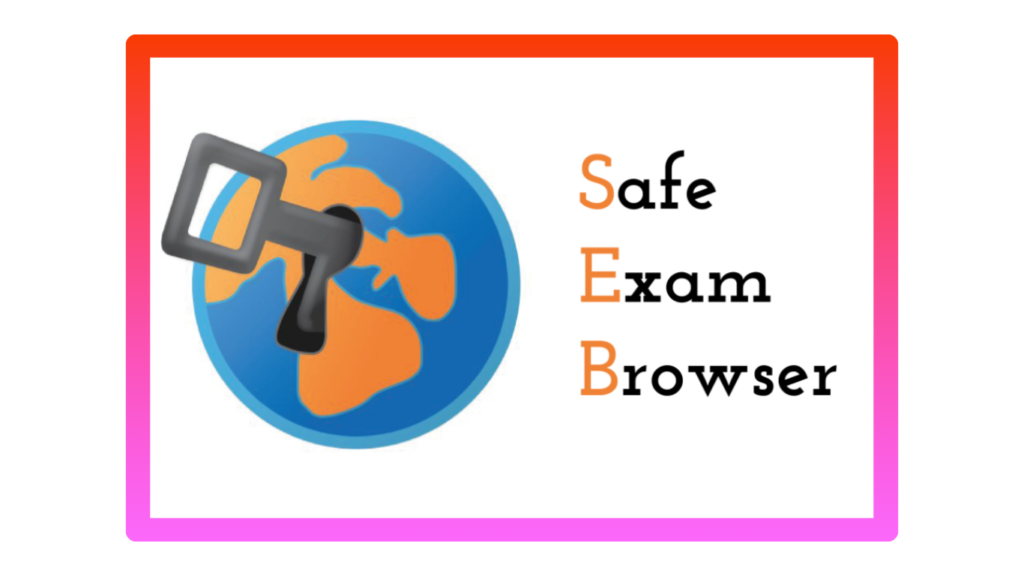
Ensures the integrity of online assessments during the onboarding process by preventing cheating and unauthorized access. This tool is particularly useful for roles that require certification or technical assessments, ensuring that the evaluation process is fair and credible.
AI Proctoring
Monitors online assessments to ensure compliance and integrity, providing a secure and fair evaluation environment. AI proctoring tools can detect unusual behavior, flagging potential issues for further review. This helps maintain the credibility of the assessment process and ensures that all candidates are evaluated fairly.
Automated Paperwork Management
AI can handle the generation, distribution, and tracking of onboarding documents, reducing the administrative burden on HR teams. This ensures that all necessary paperwork is completed accurately and on time, streamlining the onboarding process and reducing the risk of errors.
Chatbots for FAQs
AI-powered chatbots can answer common questions and provide instant support to new hires, enhancing their onboarding experience. These chatbots are available 24/7, providing timely assistance and reducing the workload on HR staff. They can also gather feedback from new hires, helping to identify areas for improvement in the onboarding process.
Personalized Learning Pathways
AI can create customized training programs based on the new hire’s role, skills, and learning preferences, making the onboarding process more effective. By analyzing the skills, preferences, and learning styles of new hires, AI can provide personalized learning pathways that ensure new employees receive the specific support they need to succeed in their roles.
Feedback and Performance Tracking
AI can gather feedback from new hires and track their progress throughout the onboarding process, providing valuable insights for continuous improvement. This data-driven approach helps HR teams identify areas for improvement and make data-driven decisions to enhance the onboarding process. AI can also perform sentiment analysis on feedback, identifying common themes and areas of concern.
Handling Large Recruitment Drive Volumes
AI can efficiently manage high volumes of candidates, making it ideal for large recruitment drives. AI tools can screen resumes, schedule interviews, and even conduct preliminary assessments, significantly reducing the time and effort required for high-volume hiring. This ensures that no candidate is overlooked and that the best talent is identified and hired quickly.
The Role of Analytics in AI-Powered Onboarding
Analytics play a crucial role in enhancing AI-powered onboarding processes:
Predictive Analytics: AI can analyze data from various sources to predict potential issues or areas of improvement in the onboarding process. This proactive approach helps in addressing concerns before they escalate, ensuring a smoother onboarding experience.
Personalization: Data analytics allows for the customization of onboarding activities based on individual needs, skills, and job roles. This personalized approach ensures that new hires receive the specific support they need to succeed in their roles.
Performance Tracking: By analyzing key metrics such as time-to-productivity, training effectiveness, and employee feedback, companies can identify areas for improvement and make data-driven decisions to enhance the onboarding process. This leads to a more efficient and effective onboarding experience.
Engagement and Retention: Analytics can help track and measure employee engagement and retention rates. By identifying factors that contribute to high engagement and retention, organizations can refine their onboarding strategies to create a more welcoming and supportive environment for new hires.
Continuous Improvement: Data-driven insights from onboarding analytics enable organizations to continuously refine and optimize their onboarding processes. This iterative approach ensures that the onboarding experience remains relevant and effective in meeting the evolving needs of new hires
AI-Powered Features in Onboarding
Several AI-powered features can enhance the onboarding experience:
Safe Exam Browser: This tool ensures that online assessments are conducted securely, preventing cheating and unauthorized access. It is particularly useful for roles that require certification or technical assessments.
AI Proctoring: AI proctoring tools monitor candidates during online assessments, ensuring compliance and integrity. This feature is essential for maintaining the credibility of the evaluation process.
Automated Paperwork Management: AI can automate the generation, distribution, and tracking of onboarding documents, reducing the administrative burden on HR teams and ensuring that all necessary paperwork is completed accurately and on time.
Chatbots for FAQs: AI-powered chatbots can provide instant answers to common questions, offering 24/7 support to new hires. This feature enhances the onboarding experience by providing timely assistance and reducing the workload on HR staff.
Personalized Learning Pathways: AI can analyze the skills, preferences, and learning styles of new hires to create customized training programs. This personalized approach ensures that new employees receive the training they need to succeed in their roles.
Feedback and Performance Tracking: AI can gather feedback from new hires and track their progress throughout the onboarding process. This data-driven approach provides valuable insights for continuous improvement and helps identify areas where additional support may be needed.
Conclusion
The challenges of traditional campus hire onboarding are significant, but AI offers powerful solutions that can transform the process. By automating routine tasks, personalizing the onboarding experience, and providing data-driven insights, AI can create a more efficient, engaging, and effective onboarding process. The benefits of AI in onboarding are clear: increased efficiency, enhanced engagement, higher retention rates, cost savings, and improved productivity.
As organizations continue to adopt AI-powered tools and technologies, the future of employee onboarding looks promising. By leveraging AI, companies can ensure that their new hires have a positive and productive onboarding experience, setting the stage for long-term success and satisfaction. The integration of AI in onboarding is not just a trend but a strategic move towards creating a more dynamic and responsive HR function that can meet the evolving needs of the modern workforce.
In conclusion, AI is revolutionizing campus hire employee onboarding by addressing the limitations of traditional methods and offering innovative solutions that enhance the overall experience. As we move forward, the adoption of AI in onboarding will continue to grow, driving positive outcomes for both employees and organizations.







